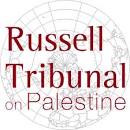Russell Tribunal on Palestine Concludes Deliberations toward Action

The fifth and concluding session of the Russell Tribunal on Palestine (RToP) convene in Brussels on 16–17 March 2013 to consolidate the findings of the four thematic sessions at London, Barcelona, Cape Town and New York since 2010. The Russell Tribunal pursued its historic mission, as it has previous investigated the Vietnam War and dictatorship in Latin America, this time while the world is building a citizen-based protest structure to denounce and resolve such intolerable situations. In that spirit, too, the Tribunal’s final session was dedicated to the memory of juror Stéphane Hessel, who passed away on 27 February 2013 at the age of 95.
The final session summarized the findings of the four previous sessions:
- The particular violations of international law committed by Israel;
- The responsibility of private corporations that assist Israel in its violations of international law;
- Overarching features of Israel’s regime vis-à-vis the Palestinians as apartheid and sociocide;
- The responsibility of States, in particular the United States of America, by assisting Israel in its violations of international law;
- The responsibility of international organizations (the UN and the EU), which assist Israel in its violations of international law.
The Brussels session took stock of important events since the New York session and envisioned the ways forward, and outlined necessary future action.
The jury noted Israel’s November 2012 attack on Gaza and UN Security Council’s failure to take any decision on that offensive. They cited the US government role in securing a ceasefire, while the US Congress gave support and encouragement to Israel. This, the jury found, relates to the pattern of obstructive diplomatic conduct of the United States.
Since the Russell Tribunal’s New York session last year, Palestine achieved status as a UN “non-member observer status” by resolution of the General Assembly. The United States joined Israel in voting against the resolution, and Israel responded with plans to construct 3,000 more housing units to colonize the E1 corridor between East Jerusalem and the settler colony of Maale Adumim. While the EU strongly opposed that move, the United States and the Security Council took no stand.
In January 2013 the UN Human Rights Council’s Independent Fact-Finding Mission to Investigate the Implications of Israeli Settlements concluded that the settler colonies in the West Bank and East Jerusalem had produced a dual legal system of segregation in which settlers enjoyed superior rights to Palestinians, and which violated a bundle of human rights of Palestinians. The Tribunal noted also that the Security Council has failed to respond to that important report, despite its 88 resolutions from 1967 until the end of 2012, requiring Israel to withdraw from the Occupied Territory.
The jury found that Israel’s January 2013 boycott of its Universal Periodic Review (UPR) by the UN Human Rights Council was yet another demonstration of contempt for international human rights norms and international cooperation, “made possible by the complacency of the international community.”
In its 2011 Cape Town session (see Land Times No. 1), the Tribunal found that Israel subjects the Palestinian people to an institutionalized regime of domination amounting to apartheid as defined under international law. The jury received expert testimony and other evidence on State practice in which Palestinian citizens of Israel, while entitled to vote, are excluded from the “Jewish nation,” as defined by Israeli law, and are, therefore, are denied the benefits of “Jewish nationality” and subject to systematic discrimination across the broad spectrum of codified human rights. In that connection also, the Tribunal reviewed the relationship between the State of Israel and the quasi-State Jewish “national” institutions (the World Zionist Organisation/Jewish Agency and Jewish National Fund) that manage Palestinian lands and properties and “national” development, delivering the material privileges exclusively for Jews. Irrespective of differences in law and practice across historic Palestine, the Tribunal concluded that “Israel’s rule over the Palestinian people, wherever they reside, collectively amounts to a single integrated regime of apartheid.”
Consistent with its findings, the Tribunal noted also that, in March 2012, the UN Committee on the Elimination of Racial Discrimination (CERD) “took the unprecedented step of censuring Israel under the rubric of apartheid.” Accordingly, CERD urged Israel, pursuant to Article 3 of the Convention, to prohibit and eradicate policies or practices of racial segregation and apartheid that “severely and disproportionately affect the Palestinian population” (para. 24).
The fourth RToP session concluded that the legacy of the UN response to repeated and consistent violations of international law by Israel is a “history of failure and complicity,” since its admission of Israel as a member State. The jury then proffered advice to the relevant UN bodies to take remedial steps, including the Prosecutor of the International Criminal Court to accept jurisdiction over Palestine, as the Palestinian authorities requested in January 2009, and, as the Goldstone Report urged, to initiate an investigation into international crimes committed in Palestinian territory since 1 July 2002, including crime of apartheid.
Following from these findings, the Russell Tribunal also concluded that the UN General Assembly should reconstitute the UN Special Committee against Apartheid and convene a special session to consider the question of apartheid against the Palestinian people. With the Special Committee operating as it did in response to apartheid formerly practiced in South Africa, RTOP proposed to contribute a list of individuals, organizations, banks, companies, corporations, charities and any other private or public bodies that assist Israel’s apartheid regime. As concluded in the final RToP session, the foregoing deliberations now face the challenge of taking appropriate corrective action.
|